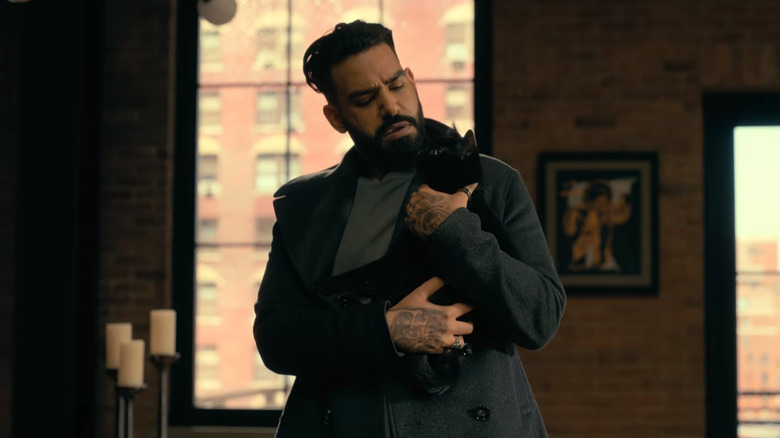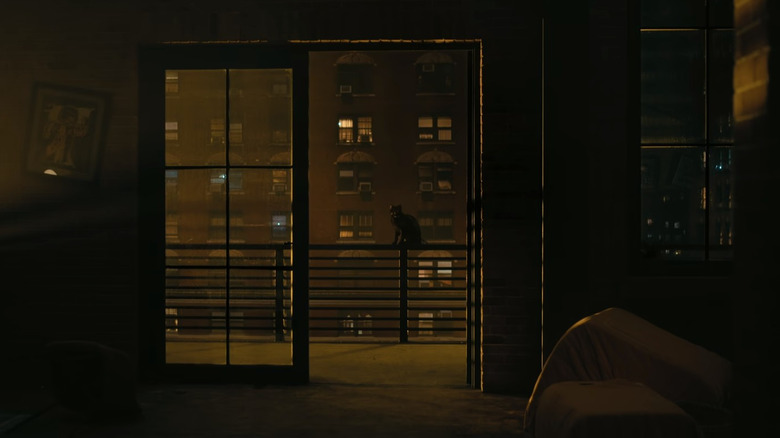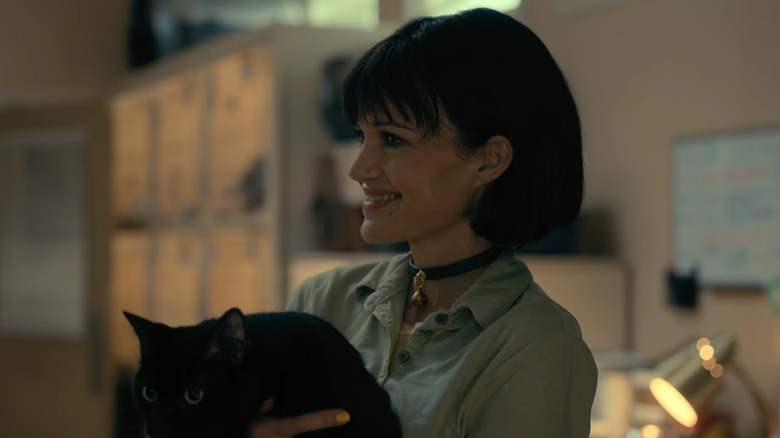The Fall Of The House Of Usher: Pluto The Cat Means More Than You Likely Think
Contains spoilers for "The Fall of the House of Usher" episode 4 — "The Black Cat"
"The Fall of the House of Usher" adapts many of Edgar Allan Poe's most famous short stories and poems, even including material from his only completed novel. "The Tell-Tale Heart," "The Raven," and of course, the short story for which the whole series is based all work their way into the story. But it wouldn't be a true Poe homage without a nod to "The Black Cat" as well — one of the writer's most widely read tales.
Episode 4 of the Mike Flanagan Netflix series bears the name of "The Black Cat," and it adapts the story to revolve around Napoleon Usher (Rahul Kohli). One of the illegitimate children of pharmaceutical magnate Roderick Usher (Bruce Greenwood), Leo is a video game developer (or at least, he funds actual video game developers) and minor-league drug dealer who cheats on his boyfriend on a regular basis. Not exactly a stand-up dude, but certainly not someone you'd guess would kill and mutilate his own cat. That's exactly what happens to his boyfriend's cat Pluto in the show, and when Leo tries to replace him with an identical copy, things start to go wrong immediately.
There's more going on in "The Black Cat" than meets the eye, however, so let's dive into both Poe's story and the "Fall of the House of Usher" episode to see what's really going on.
What Pluto the cat represents in Poe's story
The original short story is told in first-person from the perspective of a man who's been convicted of killing his wife. He relays an account of his recent life, how he and his wife both loved animals and had several pets, including a black cat named Pluto. Things get dark, however, once the narrator becomes an alcoholic and begins abusing the very pets he once treasured. This causes Pluto to behave much more timidly around him, and in retaliation, the narrator mutilates Pluto and hangs him from a tree.
The narrator acquires a new black cat out of guilt, but he soon comes to distrust and despise that animal as well. When he tries to kill the cat, his wife intervenes, and he kills her instead, ultimately being caught, convicted, and executed.
Symbolically, the cat itself represents the narrator's deteriorating mental state. Poe himself struggled with heavy drinking throughout his life, though different historians disagree on the level of his alcoholism. In "The Black Cat," the narrator strikes out at his pets from a place of self-loathing, projecting the terrifying person he's become onto them and blaming their behavior instead of his. The cat's reappearance later within the walls of the house extends this metaphor. Though the man can try to ignore his problem, it will always come back to haunt him and make him lose control.
How The Fall of the House of Usher changes The Black Cat
Many of these story elements are preserved in "The Fall of the House of Usher." The main difference (aside from the modern-day setting, of course) is that Napoleon's struggle isn't with alcoholism but with drug addiction of several varieties. In the wake of his siblings' deaths, he falls even deeper into his use of various substances, eventually waking up one morning to find that he's butchered his boyfriend's cat. Horrified, he hides the body and cleans up, claiming that the animal must have gotten out in the night. He then finds an identical cat and plays it off as the same one.
Of course, the new cat is provided by Verna (Carla Gugino), the mysterious entity who haunts the Usher family throughout the show. In the episode's climax, she becomes the cat, playing on the ancient superstition that black cats are witches in disguise. It's also interesting to note that Pluto, the name of the cat in both Poe's version and the show, is the Roman god of the underworld. Verna herself takes her name from Laverna, another, lesser-known Roman god associated with thieves, liars, and the underworld.
All episodes of "The Fall of the House of Usher" are now streaming on Netflix.
If you or anyone you know needs help with addiction issues, help is available. Visit the Substance Abuse and Mental Health Services Administration website or contact SAMHSA's National Helpline at 1-800-662-HELP (4357).


